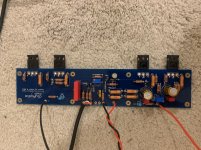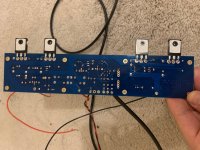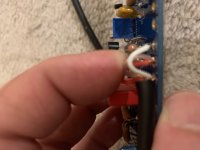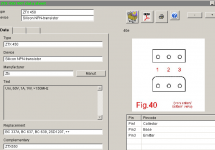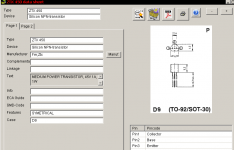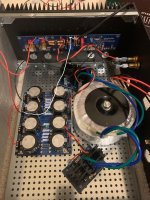I stuffed the Aleph J boards today and did a quick mount in the chassis for a test.
Adjusting the bias for 350mv, then 400mv is no problem on either board.
When I connect a speaker, sometimes LED3 will dim and LED2 will go bright. Then consistently maintain this state if I turn the output of my source up.
If I turn the source output up to the extreme, I'll hear some muffled, highly distorted sound. I may not have heard it at all but my speakers are very efficient. At the same time, LED will blink - seemingly with the amplitude of the input signal.
The behavior is exactly the same on both boards - so whatever mistake I made, it's consistent 🙂
I don't know where to start troubleshooting, and would greatly appreciate help.
The only test tools I have are some inexpensive digital multi-meters.
Thanks in advance!
Adjusting the bias for 350mv, then 400mv is no problem on either board.
When I connect a speaker, sometimes LED3 will dim and LED2 will go bright. Then consistently maintain this state if I turn the output of my source up.
If I turn the source output up to the extreme, I'll hear some muffled, highly distorted sound. I may not have heard it at all but my speakers are very efficient. At the same time, LED will blink - seemingly with the amplitude of the input signal.
The behavior is exactly the same on both boards - so whatever mistake I made, it's consistent 🙂
I don't know where to start troubleshooting, and would greatly appreciate help.
The only test tools I have are some inexpensive digital multi-meters.
Thanks in advance!
can't see properly on pictures - orientation of small bjts?
if ZTX, legs up, flat to your face , CBE from left to right
edit: in any case , it'll depend , is it "EU" rounded case, or "US" , more flat case
check what you have
here's pinout for both
if in doubt, consult datasheet
if ZTX, legs up, flat to your face , CBE from left to right
edit: in any case , it'll depend , is it "EU" rounded case, or "US" , more flat case
check what you have
here's pinout for both
if in doubt, consult datasheet
Attachments
Last edited:
after some more looking , it seems that bjts are properly oriented
but also I can't see that you have GND wire from PSU to channel pcb?!?!
but also I can't see that you have GND wire from PSU to channel pcb?!?!
Looks like the power supply is not connected correctly.
Red is from the ground not the positive in your pictures.
Also as Zen Mod said, no PSU ground.
my two cents.
Red is from the ground not the positive in your pictures.
Also as Zen Mod said, no PSU ground.
my two cents.
Bottle: Thanks. I also thought that would be the polarity based on the markings on the PCB. But, when I put my meter on it, negative was toward the outside on that side.
Zen Mod: Thanks. Can you please walk me through that? I have the negative side of the PS connected to V- and the positive side connected to V+. When loaded with the channel board, they're measuring 24.6V. Is there an additional connection I need to make?
Thanks,
Peter
Zen Mod: Thanks. Can you please walk me through that? I have the negative side of the PS connected to V- and the positive side connected to V+. When loaded with the channel board, they're measuring 24.6V. Is there an additional connection I need to make?
Thanks,
Peter
I think you want this.
This is it.
The PSU board has 2 rails, a positive side, and a negative side. Not one side per amp board. The positive leads have to go to both boards, as do the negative leads, and a ground (either side ground is fine)
Taking a ground line (through a CL-60 inrush limiter) to a single "star" grounding point on your chassis is generally recommended too, both for safety and to avoid ground loops.
6L6 has some great points on PSU construction, and implementation in his various build guides. It would be worth looking at the starting pages of his guides, and get a clear picture.
Last edited:
My first DIY solid state amp was an Aleph J as well. I had to spend awhile learning how the PSU works. Here is the picture I took (while DIYAudio still let us store pictures here. Don't mind the switch and slow start boards on top of the toroid.

Sorry, I still don't seem to be about to get pictures to show here. You have to right click that link and open in a new tab or window.

Sorry, I still don't seem to be about to get pictures to show here. You have to right click that link and open in a new tab or window.
Last edited:
Bottle: You're absolutely right. There was something about -24v on the schematic that escaped me 🙂 I'm going to wire that up as soon as I get a break from work. I'll let you know how it goes.
My first DIY solid state amp was an Aleph J as well. I had to spend awhile learning how the PSU works. Here is the picture I took (while DIYAudio still let us store pictures here. Don't mind the switch and slow start boards on top of the toroid.

Sorry, I still don't seem to be about to get pictures to show here. You have to right click that link and open in a new tab or window.
It just now struck me that was 6 years ago. My how time flies...
Bottle: That was it! Now I have to figure out why it sounds awful 🙁 I'm hoping it just needs to break in.
It cant have even warmed up yet! 🙂
Get the bias set and let it warm up. Run it for a while in the background. Normally these take about 100 hours to settle in. IMHO
Get the bias set and let it warm up. Run it for a while in the background. Normally these take about 100 hours to settle in. IMHO
While you are listening in background read 6L6 build guide, the first of it where he assembles Amp. Shows great pics and detailed fireup instructions. If you plan to build more amps, read all his power amp build guides first few pages, all have good assembly pics, some showing different details better than the others. All the power supplies are basically the same.
Whoops forgot answer to question yes, .400....post #3 in build guide, scroll down to fire up instructions.
Aleph J illustrated build guide
Russellc
Whoops forgot answer to question yes, .400....post #3 in build guide, scroll down to fire up instructions.
Aleph J illustrated build guide
Russellc
Last edited:
When you say it sounds "awful", what do you mean.
If it is horrible because it is distorted then that might be down to a wiring error or component failure.
It's unlikely that you would describe the Aleph sound as "awful" if it is working correctly.
You need a good SOLID 0V ground point. Everything needs to be returned to that point.
If it is horrible because it is distorted then that might be down to a wiring error or component failure.
It's unlikely that you would describe the Aleph sound as "awful" if it is working correctly.
You need a good SOLID 0V ground point. Everything needs to be returned to that point.
Last edited:
- Home
- Amplifiers
- Pass Labs
- Aleph J - First Test Issues / No Sound / Blinking LEDs

